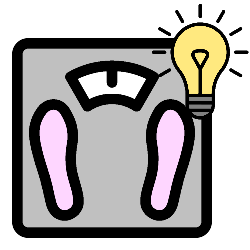
Measure the blood pressure, scan the body fat percentage or calculate the BMI. And all this linked to the smartphone. When is a smart scale useful?
What is a smart scale?
A lot has changed in the field of roads in recent decades. The old trusted scale with pointer has made way for a digital variant. It now also has a successor: the smart scale. If you put a smart scale next to its digital brother, you may think they are the same. The difference is therefore not on the outside, but on the inside. A smart scale not only measures the weight of the user, but can also measure these things:
- Fat percentage (sometimes specific per body part)
- Blood pressure
- Muscle mass and/or quality
- Moisture content
- bone mass
- BMI
- Calorie requirement
The scale can measure all data because so-called electronic pulses are sent through the feet of the user. So take off your shoes and socks before stepping on a smart scale. It differs per smart scale what is measured. Some scales take all of the above options, some less and some even more.
Smart scales with app
Many smart scales come with a smartphone app. Users install it and connect it to the scale. All data that the scale measures is automatically sent to the app and saved. This way users can see trends. For example, whether their weight or blood pressure is stable or fluctuates a lot. This is a simple way to keep track of health.
Already have a fitness app or watch? Then the smart scale can often be linked to this. As a result, data from both devices is stored together. This gives users insight into as much health data as possible. So not only what the scale measures, but also, for example, sleep patterns and heart rate.
Smart scales without app
There are also smart scales without an app. They measure the same things as smart scales with an app. The only difference is that users have to write down the data themselves to discover trends in their health.
When is a smart scale useful?
It should be clear: smart scales measure more than other scales. This is especially useful when someone wants to keep a close eye on their health. The smart scales with an app in particular provide a clear insight into the course of health, in the short and longer term. Does anyone have high blood pressure and weight? Then two separate devices (a blood pressure monitor and a scale) are no longer needed to keep track of whether they are already falling. By linking with other health apps and devices, users have complete insight into their health. Many smart scales also provide tips via the app. As a result, users would be more motivated to improve their health. However, do you only want to keep track of the weight? Then an analog or digital scale will also suffice.
What to look for in smart scales?
Smart scales are not for everyone. For example, they are not recommended for people with a pacemaker. That’s not surprising, since the scale gets its data from electronic pulses that are sent through the body via the feet.
Apart from that, a smart scale is generally more expensive than a digital version. And certainly more expensive than the analog version. A smart scale can easily cost several tens of euros. Anyone looking for a scale that collects a lot of different data often pays between fifty and one hundred euros. Do you want a really smart copy? Then the price rises even further, up to four hundred euros.
Different names:
Every (web) store has a different name for the smart scale. For example, you may encounter this during an online search for a smart scale:
- Smartphone compatible scales
- Body analysis scale
- Smart scale (English for smart scale)